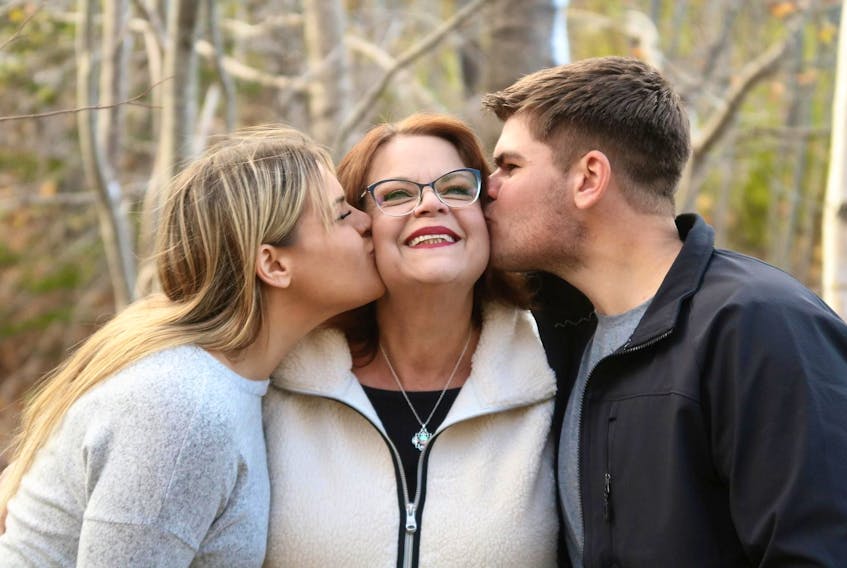SYDNEY, N.S. – When Heather Parsons first learned she had pancreatic cancer last October it was the worst possible news she could have received.
But the 55-year-old was no stranger to tough times. After a divorce when she was 44, she returned to school and worked three part-time jobs while studying to eventually work in the human services field at the Horizon Achievement Centre, a job she loves. She vowed to beat her illness, knowing she had the full support and love of her family.
But since then, she has learned she may have to fight the deadly disease with next to no financial help. She may even have to return to work before her treatments are completed.
“I’m just in shock,” Parsons told the Cape Breton Post, moments after walking into her Hornes Road home, outside Sydney, following her bi-weekly chemo treatments. “I never expected this.”
What Parsons never expected was the fact she would have limited access to financial support during her illness.

Her workplace, a vocational training and employment services centre for people with intellectual disabilities, like so many now, did not offer long-term disability benefits.
She began investigating Employment Insurance’s sick benefit program. EI offers several programs including up to 45 weeks for regular benefits if you lose your job or are laid off, up to a year of maternity leave and now 38 weeks for those receiving the Canada Recovery Benefit and the Canada Recovery Caregiving Benefit for those affected by COVID-19.
Despite all that, the sickness benefit remains at 15 weeks. There is an option of applying for the Canada Pension Plan disability benefit afterward but for a person in Parsons’s position, $800 a month would be the most she would get. There is also no guarantee you will receive the benefit you apply for if your cancer is not deemed “severe” enough.
“I almost threw up,” said Parsons, when she learned what she would be entitled to.
“I have a mortgage on my home. I have a car and the normal bills that every person has. I was not expecting to be struck down with cancer. I lived a good, healthy life. I didn’t drink, I didn’t smoke, I never expected this. With what I make and being single, I don’t have a lot of savings so I am between the proverbial rock and a hard place.
“I can’t lose my home. I can’t lose everything I fought for.”
Affects many
Unfortunately, Parsons’s story is not that uncommon, says Tom MacNeil, a medical social worker at the Cape Breton Cancer Centre in Sydney.
It’s common enough that he’s been involved in a national study that should soon be published about how it affects many people across this country.
“It never meets the public eye, really,” said MacNeil. “There needs to be a recognition that there are people out there living with serious illness and there’s lots of people out there with cancer. The odds of getting cancer in your lifetime are one in two.
“On the bright side, people are living longer with it. And there’s more treatments coming out but the chance of getting cancer is that high. And the economic impact of that is high, too. So you’re going to have more and more people facing this and jobs today, they might be contract jobs that don’t offer benefits or lower-paying jobs that don’t tend to offer workplace benefits. Fifty per cent or more don’t have workplace benefits.”
It’s a problem that came to the attention of former Sydney-Victoria MP Mark Eyking while he was still in office.

Just before retiring in 2019, he moved a motion in the House of Commons asking the Standing Committee on Human Resources, Skills and Social Development and the Status of Persons with Disabilities to examine the possibility of extending the maximum number of weeks of EI sick benefits for those with long-term illnesses and to report its findings and recommendations to the House no later than six months from the adoption of the motion.
“Canada is known as one of the most progressive countries in the world. However, it is less known that our country also has one of the shortest periods of sickness protection in the modern world,” Eyking told the House at that time.
“Many European countries see the benefit in bridging. They find that bridging workers when they suffer from illness is a net benefit to their society. It is an investment. These people do not get lost in the welfare system or the pension system. When we bridge them financially through tough periods of sickness to health, they come back to work and contribute to society.”
It’s an idea that he still believes in and hopes the federal government will soon move to pass, especially since it was a plank in the Liberal's last election platform.
“It’s not just compassion, it’s the right thing to do and the sort of thing to do as a society to bridge people,” Eyking said in a recent interview with the Cape Breton Post.

“That’s the Canadian way – bridging the hard times – helping people to get through.”
Cape Breton-Canso MP Mike Kelloway says he wants to carry Eyking’s torch on this issue.
“Fifteen weeks if you’re fighting any disease and cancer in particular, that’s not a lot of time when you think about it,” said Kelloway.
“I want to see it go from 15 weeks to 26 but I don’t want to stop there. I want to go further. It’s a long game with these illnesses and we need to do better than 15 weeks. We need an EI system that is flexible and responds to the needs of Canadians.”
Losing time
Most of the people who are adversely affected under the present system are of working age, especially those who may be single since they can’t rely on anyone else’s income during their illness.
If you’re in your 50s, it’s particularly difficult since it can devastate you financially and not allow you any time to return to the workforce once you’ve recovered and make up that lost income.
“People in their 20s have time to do that,” said MacNeil.

In addition to 90 countries providing benefits of longer duration than Canada and 127 countries offering a higher wage replacement, MacNeil said Canada has a long way to go in helping people when they need it and what they actually need.
“Canada is not a sterling example of our social safety net working for people and researchers say the CPP disability benefits are among the least generous of public initiatives. So who gets really hit hard are single people,” MacNeil said.
First of all, the EI benefits do not last long enough to cover a person in case of a serious illness.
“Cancer treatments are more like 26 weeks but they can last a year for some types of cancer, easily, and not everything goes perfectly or in order either,” he said.
“There’s treatment setbacks, you get surgery, 'Oh, there’s an infection,' and then you’re delaying your chemotherapy. You can’t be cutting it that fine. Fifteen weeks does not nearly come near what a person living with cancer needs. Nor does Canada Pension disability pay an adequate income for people. So people with cancer — and I can only speak to people with cancer, other illnesses could be similar — could be plunged into poverty.”
Secondly, what is being offered is well below Statistics Canada's low-income cutoff. If you become ill, bills don’t suddenly disappear. Yet, you’re expected to make due with much less.
Since being plunged into poverty is a given, even if it’s a situation you have no control over, it can affect you psychologically, said MacNeil.
There is another option but for most, it can be a dangerous one.
Back to work soon
“They could go back to work but not feel ready and we found in our study that people did go back to work too soon and it was really hard on them,” MacNeil said.
“They would work and go home and go to bed and that could last for a year or two. It was a physical and mental hardship on them when they had to go back to work too soon.
"For those who go on income assistance, that doesn’t pay their bills unfortunately but the other option is the Canada Pension Disability but the problem with that for people is the idea that you wouldn’t return to work again. Some people may be able to go back to work (but) typically it is designed for people not to return to work again.”
Returning to work is an option that Parsons is considering but she acknowledges it may not be possible. It can take several days to recover from a chemo session since she is undergoing aggressive treatments.
“People have to know about this. Unless you’re in the situation or touched by it from someone else, how would you know? They made sure everyone was taken care of through CERB and COVID but what about people who are all the time battling cancer? Or other illnesses. It doesn’t have to be cancer. There’s no Band-Aid for us," she said.
“My only choice may be to go back to work while on chemo and hoping I can do it. I don’t have a lot of choices here.”
Elizabeth Patterson is a culture and health reporter at the Cape Breton Post.
Resources









